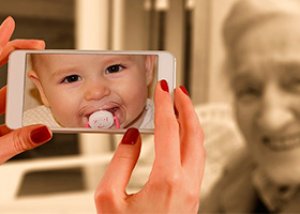
All iLive content is medically reviewed or fact checked to ensure as much factual accuracy as possible.
We have strict sourcing guidelines and only link to reputable media sites, academic research institutions and, whenever possible, medically peer reviewed studies. Note that the numbers in parentheses ([1], [2], etc.) are clickable links to these studies.
If you feel that any of our content is inaccurate, out-of-date, or otherwise questionable, please select it and press Ctrl + Enter.
Scientists have learned how to accurately estimate biological age
Last reviewed: 02.07.2025

There are many ways to determine biological age on the Internet - from standing on one leg to looking at your own skin. Of course, such methods have nothing to do with science.
And now, finally, Chinese scientists have developed the world's first method that allows you to correctly determine a person's true biological age.
Unfortunately, all people gradually age - and this is inevitable. But scientists have long been concerned about the question: if we fully understand all the complex biological processes that occur in the body, will it be possible to prevent old age and avoid it? Professor Aubrey de Grey, together with his team, who treat aging as a disease, tried to find the answer to this question. And this disease can and must be stopped.
Chinese specialists have created a specific type of urine analysis. It is assumed that this analysis will help determine the effect of anti-aging therapy, but not approximately, but precisely: according to certain biochemical features.
Perhaps not every person would like to receive true information about their biological age. However, in a full-scale sense, the innovation can become a way to predict cardinal age-related changes and even mortality.
Professor Jian-Ping Qiai, representing the National Center for Gerontology (Beijing), told about all the possibilities of the new method.
Even those people who adhere to an exclusively healthy lifestyle, gradually, year after year, age - and this is due to damage to cells and tissues. How quickly this process will proceed depends on many things - including genetics and the same lifestyle. It is possible to influence such processes, but not to the fullest extent. According to specialists who adhere to the "free radical theory", oxidative stress plays a major role in the aging of organs.
"Various waste products in the form of metabolic products can lead to oxidative damage to biological molecules - DNA and RNA. In the process of aging, the number of such damages increases, and at the same time the level of special age markers increases," the professor explains.
Such age markers can be easily determined in a urine test. Scientists conducted a test using the effective liquid chromatography method. During the experiment, the urine of more than 1,200 people of different age categories – from two to 90 years old – was analyzed. It was discovered that the level of a specific marker 8-oxo-7,8-dihydroguanosine is associated with age.
“Already after reaching 21 years of age, a person experiences an increase in the level of this marker – and this is associated with the age process.”
To sum it up, the new development of scientists for assessing biological age is a valuable device for both doctors and patients. And in the future, it can bring enormous benefits in the fight against aging.
The details are described by a gerontologist professor in the pages of Frontiers in Aging Neuroscience (frontiersin.org).

 [
[